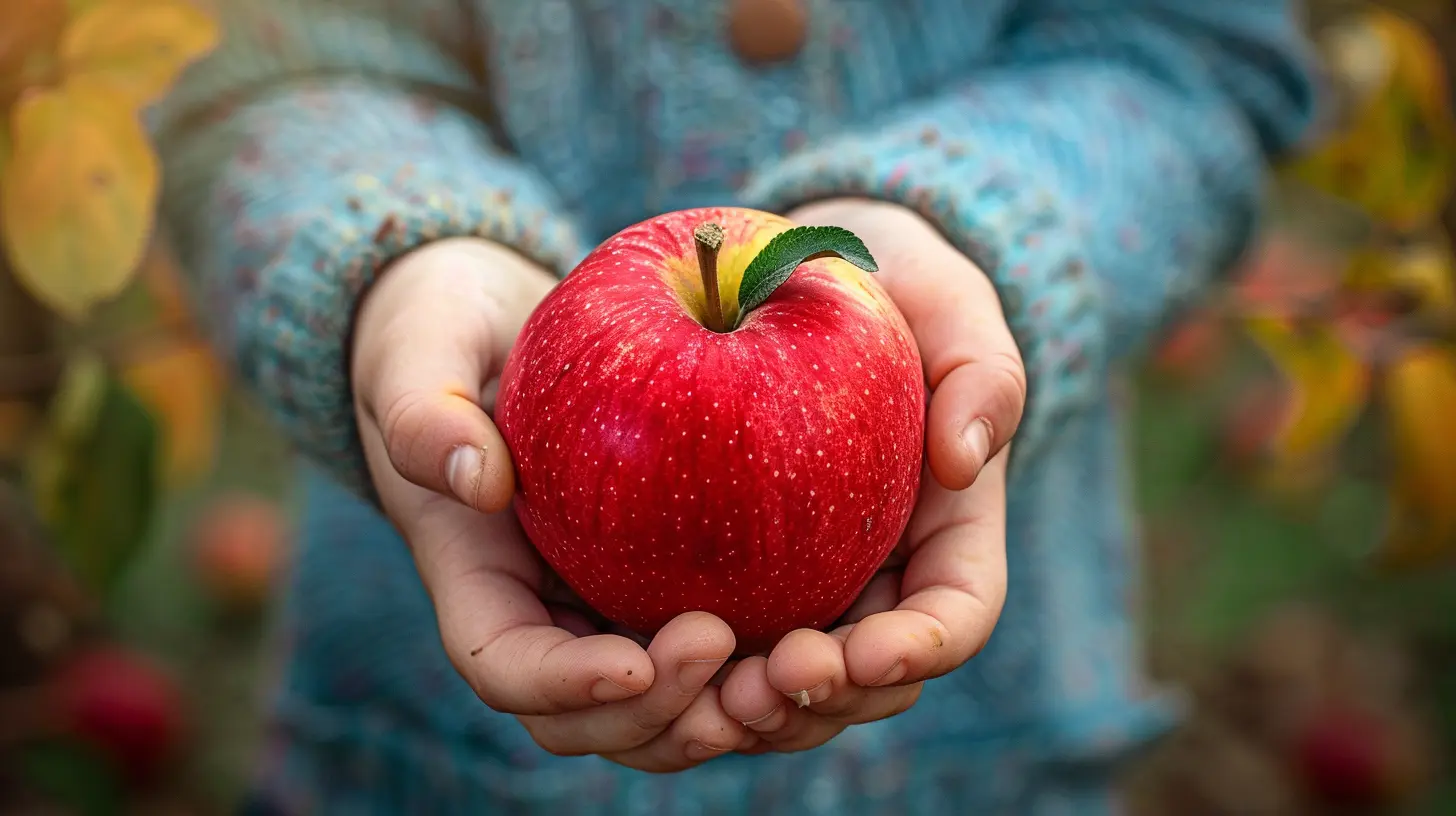Teaching Children How to Make Healthy Choices
14 September 2025
Let’s be honest—raising kids in today’s world often feels like you’re swimming against the current. Junk food is just a click away, screens are practically glued to their hands, and sleep often takes a backseat to binge-watching cartoons. But here’s the thing: if we want our kids to grow into healthy, happy, and capable adults, we’ve got to start teaching them how to make smart, healthy choices early on.
Not just yelling “eat your veggies!” or “go play outside!”—I’m talking about showing them the WHY behind those choices. Because when kids understand the why, the how comes a lot more naturally. Ready to dive in with me?
Why Teaching Healthy Choices Matters So Much
You know that old saying, “Old habits die hard”? That’s especially true when it comes to health. The habits our kids develop now—whether it's reaching for fruit instead of candy or hopping on a bike instead of the couch—can shape their future. We’re not just raising kids. We’re raising the next generation of adults.Think of yourself as your child’s life coach. You're setting the foundational beliefs they'll use when you're not there to say, “Uh-uh, that’s not a great idea.” So teaching them how to make healthy choices matters way more than just telling them what to do.
Start with the Basics: What Does "Healthy" Even Mean?
Let’s be real—“healthy” can be a confusing word. It can mean different things to different people. And for a child, “healthy choice” might sound like code for “the not-so-fun option.”That’s why it’s important to define what healthy looks like—for them. Break it down into bite-sized ideas:
- Food choices that give us energy
- Movement that makes our hearts strong and bodies feel good
- Rest that helps our brains and muscles recharge
- Habits that keep our minds calm and happy
Once kids understand that being healthy helps them do all the fun stuff—run faster, learn better, sleep well—they’ll be more open to making those choices on their own. And that’s the magic.
Model the Behavior You Want to See
Remember when your toddler repeated that word you said under your breath in traffic? Yeah, kids are watching us all the time. Every snack we pick, every time we hit snooze instead of going for a walk—they’re learning what “normal” looks like.So if we tell them to choose water over soda but they see us polishing off a can of cola like it’s gold, what lesson are we really teaching?
Here’s the kicker: you don’t need to be perfect. You just need to be conscious. Let your kids see you make healthy choices—and talk about why.
Something as simple as, “I’m choosing this salad because I’ve been sitting all day and my body needs something light and fresh,” gives them a peek into your decision-making process. It’s like giving them a cheat sheet to your healthy habits.
Make Nutrition Simple and Fun
Let’s face it, the food battle at the dinner table is a tale as old as time. But teaching your child how to make healthy food choices doesn’t have to feel like dragging a mule through mud.Get Them Involved
Involve them in grocery shopping (yep, even if it adds 20 minutes to your trip). Let them pick a new fruit or vegetable to try each week. Have them help you in the kitchen—mixing, measuring, or even choosing recipes. When kids feel ownership over their food, they’re more likely to eat it.Teach the Rainbow Rule
A quick, easy way to teach nutrition? Eat the rainbow. And no, not Skittles. Real food. Try saying something like, “Let’s see how many colors we can get on our plate tonight!” It turns dinner into a challenge or a game.Don’t Ban Foods—Balance Them
Outright banning candy or chips might make them more appealing. Instead, teach balance. Say, “Cookies are a treat we enjoy sometimes, and most of the time, we choose foods that help our bodies grow strong.” This teaches moderation—one of the most powerful lifelong health habits.Build Movement Into Everyday Life
Exercise doesn’t have to mean a gym or a formal sport. For kids, it should feel more like play than work.Make Moving Fun
Dance in the kitchen. Go on nature walks. Play freeze tag. Ride bikes as a family. Even chores count—vacuum races, anyone?The goal is to associate movement with joy. When kids realize that being active makes them feel good, they’re more likely to want to move.
Avoid Using Exercise as Punishment
Ever hear someone say, “You ate cake, now go run it off”? That kind of talk can create an unhealthy relationship with both food and fitness. Instead, focus on how movement helps us feel energized, sleep better, and improve our mood.Teach Mindful Choices and Mental Health Awareness
A truly healthy life isn’t just about food and fitness. It’s also about emotional well-being.Teach Them to Name Their Feelings
When your child is upset, instead of saying “stop crying,” try, “Can you tell me what you’re feeling right now?” Teaching them to name and understand emotions is step one in making healthy emotional choices.Introduce Mindfulness Practices Early
This can be as simple as taking three deep breaths when they’re upset, or lying quietly for a minute before bed to think about what they’re grateful for.Think of mindfulness like brushing your teeth—it’s a small habit that protects something big: their mental health.
Let Them Make (Safe) Mistakes
It’s tempting to control everything, but giving your child the space to make their own choices—even if they’re not ideal—is essential for growth.Say they skip breakfast and feel tired at school—next time, they might be more open to grabbing that banana. The key is to talk about the consequence without shame. Ask, “How did that choice make you feel? What might you do next time?”
This builds decision-making muscles that will serve them for life.
Foster an Environment That Supports Healthy Choices
You can’t expect your child to make great choices if the environment around them makes it hard to do so.Stock Your Home with Healthy Options
It’s a lot easier to choose fruit when there’s a bowl on the counter than when it’s hidden behind a bag of chips in the pantry.Create Routines
Kids thrive on routine. Having set times for meals, play, homework, and sleep provides structure that supports healthy habits.Limit Screen Time Without Making It a Battle
Make screen time a privilege, not a given. Set clear boundaries and offer alternatives: puzzles, books, crafts, or outdoor play. When screens aren’t the default, kids are more likely to engage in healthier activities.Be Patient—It’s a Journey
This isn’t a one-and-done lesson. Teaching your child to make healthy choices is a process that evolves as they grow. There will be setbacks. Days when dinner is ice cream (hey, it happens). Weeks when they fight you on bedtime. That’s okay.Keep the lines of communication open. Praise progress, not perfection. Make it a collaborative journey instead of a dictatorship.
Remember, you're planting seeds. Water them with love, patience, and consistency, and watch your child bloom into someone who makes wise, healthy choices on their own.
Helpful Scripts to Try With Your Kids
Want to start these conversations but don’t quite know what to say? Here are a few sentence starters:- “How did that choice make your body feel?”
- “What’s one thing we could do today to help our hearts stay strong?”
- “Let’s see if we can find a food we've never tried before that grows in nature.”
- “When I’m tired, I try to go to bed earlier so I feel better the next day. What could you try?”
These little moments of teaching can slide right into your everyday routines. No lectures required.
Final Thoughts
Teaching children how to make healthy choices is one of the most powerful gifts you can give them. Not only does it pave the way for a lifetime of physical and emotional wellness, but it also builds their confidence and independence.You don’t need to be a nutritionist, fitness trainer, or therapist to raise healthy kids. You just need to be present, intentional, and willing to walk the journey alongside them.
So next time you're debating between fast food and cooking together at home, or fighting over bedtime routines, remember: every choice is a tiny building block. One day, all those tiny blocks stack up to build a strong, resilient, and healthy adult.
And isn’t that what we’re all aiming for?
all images in this post were generated using AI tools
Category:
Parenting TipsAuthor:

Kelly Snow
Discussion
rate this article
1 comments
Madison Bailey
Teaching children how to make healthy choices is essential for their long-term well-being. By modeling healthy behaviors, discussing nutrition openly, and encouraging active lifestyles, parents can empower their kids to make informed decisions about their health.
September 19, 2025 at 3:16 PM

Kelly Snow
Thank you for highlighting the importance of modeling healthy behaviors and open discussions about nutrition. Empowering children with knowledge and positive habits is key to fostering their lifelong well-being!


